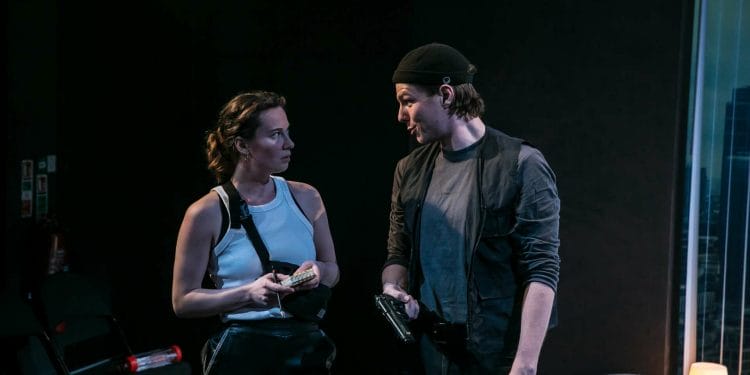 Snowflakes makes you think. It makes you laugh. It makes you want to look away (although you find you can’t). But what Snowflakes really does is make you afraid. Because this might be an imagined future, one in which vigilante justice isn’t just condoned but legitimised, but it feels just a little too real for comfort. A little too real to be fiction for too long. That’s where the power of Snowflakes lies, and that’s why it’s an important play right now – it’s a haunting and compelling lesson about what could happen if we keep rushing down this road, and the destination is a bloody one.
Snowflakes makes you think. It makes you laugh. It makes you want to look away (although you find you can’t). But what Snowflakes really does is make you afraid. Because this might be an imagined future, one in which vigilante justice isn’t just condoned but legitimised, but it feels just a little too real for comfort. A little too real to be fiction for too long. That’s where the power of Snowflakes lies, and that’s why it’s an important play right now – it’s a haunting and compelling lesson about what could happen if we keep rushing down this road, and the destination is a bloody one.
Snowflakes centres around Marcus and Sarah who work for a startup that metes out justice. All those Twitter storms and Facebook rants can now come to something instead of fizzling out leaving just a bad taste in the mouth – now they lead to violence and death, every second of which is live-streamed. It’s Tony who is the subject of this outrage, and as we watch his hotel room turn into a very unsafe space, we’re confronted with the question of what we, the audience, would do. Would we watch? Would we vote on the outcome? Would we turn away and pretend it wasn’t happening?
It’s uncomfortable, and that’s the point, but there are moments of relief. The show seamlessly blends comedy, drama, and satire to create a unique and compelling experience that will leave you laughing, thinking, and questioning the world we live in. But in the end, you’re left feeling a little bit dirty and a little bit less of a good person, no matter what you would have done – or not done.
Snowflakes stands out because it is not afraid to address society’s more depraved and hidden undertones. The play takes chances and challenges conventions without losing its audience’s interest or making itself inaccessible. You are invited to step into a world where cancel culture reigns supreme in this spine-chilling theatre production.
Snowflakes features an impressive cast, with Henry Davis playing the role of Tony, Robert Boulton portraying Marcus, and Louise Hoare taking on the role of Sarah. The actors’ performances are both dynamic and persuasive, effectively showing all sides of each character, which is so crucial here; the audience has to be put in a position where they need to make a choice – who’s good and who’s bad? Is it really black and white or is it, as Marcus says, all about those shades of grey?
In particular, Henry Davis’s portrayal of Tony is impressive, as he convincingly embodies the role of a victim who has been subjected to bullying and abuse and a victimiser who has done his fair share of the same. Davis manages to capture the multifaceted emotions of the character, from fear and vulnerability to anger and frustration.
Robert Boulton’s performance as Marcus is equally impressive, as he skillfully portrays the character’s sadistic nature and cruel tendencies. Boulton’s performance is both chilling and captivating, and he manages to convey the disturbing nature of the character in a way that is both realistic and unsettling.
Finally, Louise Hoare’s portrayal of Sarah adds a layer of complexity to the play, as she convincingly portrays the character’s inner turmoil and hidden secrets. Hoare’s performance is nuanced and subtle, and she manages to convey the complexities of the character’s emotions with skill and precision.
Snowflakes is a play that’s equal parts cautionary tale and spine-chilling horror, allowing us to explore the consequences of taking things to the extreme; this sci-fi horror play takes a sharp look at the all-too-human tendency to push boundaries until they break and what happens when you can’t put it all back together again.
Snowflakes is at Park Theatre until 6th May

















